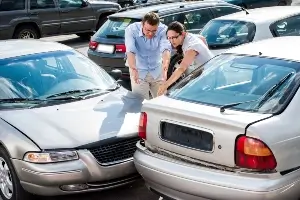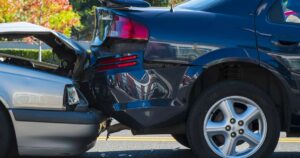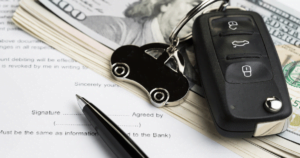 Getting hit by a driver when backing up can leave you confused about who bears responsibility for the crash. South Bend drivers face these situations daily in parking lots, driveways, and busy streets throughout the city.
Getting hit by a driver when backing up can leave you confused about who bears responsibility for the crash. South Bend drivers face these situations daily in parking lots, driveways, and busy streets throughout the city.
At Pfeifer Morgan & Stesiak, our South Bend car crash lawyers have experience helping drivers navigate complex fault disputes. We fight to protect your rights and secure the compensation you deserve after a backing-up collision. There are no upfront costs or fees when we fight for your justice.
Request a FREE case review today. Call: (574) 444-0741
Who Is Responsible If a Driver Hits Me While Backing Up Their Vehicle?
Courts determine fault in backing-up crashes based on several key factors. These collisions create unique liability questions that require careful analysis of specific circumstances. It is important for South Bend drivers to be aware of these factors to protect their rights after a backing collision.
Where Did the Crash Occur?
Parking Lots: Private property rules may apply, making fault determination more complex than public roadway crashes. Insurance companies often dispute liability more aggressively, requiring stronger evidence. Shopping centers and business parking lots see multiple backing collisions where both drivers may share fault.
Driveways: The backing driver typically bears primary responsibility, especially when entering public streets from private property. Indiana law IC 9‑21‑8‑23 requires drivers exiting driveways to yield right-of-way to all traffic on public roads. Visual obstructions like parked cars, landscaping, or snow piles do not excuse backing drivers from their duty. South Bend residential areas see many driveway backing crashes during winter months when sight lines become limited.
Public Roads: State traffic statutes ’71 Code, § 72.05 specifically state drivers must not operate unless under reasonable safety. Drivers who back up on South Bend city streets often risk traffic citations and presumptive fault. Emergencies may affect fault in in unique cases, but drivers backing up on the road may bear a heavy burden of proof.
Were You Hit in Your Vehicle or as a Pedestrian, Cyclist, or Other Vulnerable Road User?
Vehicle Occupant: Both drivers may share fault depending on speed, visibility, and right-of-way laws. Insurance companies analyze driving patterns, reaction times, and adherence to traffic laws when determining liability percentages. Forward-moving drivers who exceed reasonable speeds through parking areas may bear partial responsibility. Distracted driving, failure to maintain proper lookout, or sudden lane changes can shift fault even when struck by backing vehicles.
Pedestrian or Cyclist: Backing drivers face higher liability when striking vulnerable road users in South Bend. Indiana law protects pedestrians and cyclists, requiring backing drivers to exercise extreme caution. Crosswalks, sidewalks, and bike lanes expected drivers to yield, which could increase backing driver liability.
Who Had the Right of Way?
Forward-Moving Traffic: Indiana law Code § 9‑21‑8‑2 usually gives the right-of-way to vehicles moving forward on public roads. However, on private property like parking lots or driveways, right-of-way rules depend more on signs, road design, and common sense. Forward-moving vehicles often have priority, especially if they are following traffic signals or signs. When investigating backing accidents, insurance companies look at all the evidence, including who had the right-of-way and how carefully each driver was acting.
Backing Vehicles: Drivers in reverse must yield to all other traffic and ensure safe movement before backing up. This duty includes checking mirrors, looking over shoulders, and maintaining continuous visual surveillance while backing. Drivers are expected to refrain from backing maneuvers until they confirm the path remains completely clear of vehicles and pedestrians. Failure to yield right-of-way while backing can results in traffic citations and presumptive fault in crash investigations.
What Is a Driver’s Duty of Care While Backing Up in South Bend?
Indiana law requires all drivers to exercise reasonable care when backing up their vehicles.
Pre-Backing Safety Checks
Drivers must check mirrors, look over shoulders, and ensure their path is clear before moving in reverse. Visual confirmation takes is important even when using back up cameras when South Bend parking areas.
Continuous Monitoring Requirements
The duty to continuously monitor while backing up is expected by South Bend drivers. If pedestrians, vehicles, or obstacles enter their backing path, drivers must stop immediately.
Is the Driver Backing-Up Always At Fault if a Crash Occurs?
No. While backing drivers bear presumptive fault, exceptions exist under Indiana law.
When Forward-Moving Drivers Share Fault
Forward-moving drivers who speed, drive distractedly, or violate traffic laws may share or bear primary responsibility. Excessive speed through parking lots can also significantly shift fault percentages.
Circumstances That Reduce Backing Driver Liability
Sudden lane changes, illegal parking, or mechanical failures by forward-moving drivers can transfer fault. Indiana courts examine all driver actions leading to the collision when determining fault percentages.
Emergency Situations and Fault Exceptions
Emergency vehicle responses or avoiding imminent dangers may justify backing maneuvers that normally violate right-of-way rules. These rare circumstances require thorough investigation to establish proper fault allocation.
What If My Vehicle Was Moving When the Other Driver Backed Into Me?
Forward-moving vehicles do not automatically share fault when struck by backing drivers. Indiana law protects your right-of-way even when traveling through parking lots or past driveways. This is since reversing drivers have a responsibility to ensure their course is clear before and during reversing. Forward momentum does not diminish your legal priority over backing vehicles in South Bend.
However, your speed and attentiveness matter in fault determination under Indiana law. Excessive speed or distracted driving in areas where backing occurs frequently may reduce your compensation. South Bend drivers must exercise reasonable care even when holding right-of-way over backing vehicles.
Can I Seek Compensation If I Was Partially at Fault for a Backing-Up Crash in Indiana?
Yes. Indiana follows a comparative fault system that allows compensation even when you bear partial responsibility.
You can recover damages if your fault percentage stays below 51 percent. Your compensation is reduced by your fault percentage, but you still receive substantial recovery for medical bills, lost wages, and vehicle damage.
Indiana Right-of-Way Laws and How They Impact Liability for a Backing-up Crash
Indiana traffic statutes establish right-of-way priorities that favor forward-moving vehicles over those in reverse.
Public Street Right-of-Way Rules
Key Right-of-Way Rules:
- Public Streets: Forward-moving traffic always has right-of-way over vehicles backing from driveways or parking spaces
- Intersections: Vehicles proceeding straight or turning have priority over those backing up
- Emergency Vehicles: All backing must stop moving immediately when emergency vehicles are on the roadway
Private Property Right-of-Way Standards
- Parking Lots: Through traffic lanes maintain right-of-way over vehicles backing from parking spaces
- Shopping Centers: Main driving lanes have priority over vehicles exiting parking spaces in reverse
- Residential Areas: Forward-moving vehicles maintain right-of-way even on private driveways and roads
Evidence to Prove the Other Driver Was at Fault for Backing-up into Your Vehicle
Your lawyer can collect specific evidence that strengthens your case when the other driver backs into your vehicle. Insurance companies often dispute fault in backing collisions, requiring comprehensive documentation to prove liability.
- Backup Camera Footage: Many modern vehicles record the moments before impact during reverse maneuvers
- Parking Lot Surveillance: South Bend businesses often can capture backing collisions on security cameras
- Dashcam Footage: Forward-facing cameras show your right-of-way position when struck
- Skid Mark Patterns: Backing vehicles create distinct tire marks that show direction and speed
- Vehicle Damage Location: Impact points on your car prove the other vehicle was moving in reverse
- Witness Statements: Bystanders can confirm which vehicle was backing and which had right-of-way
- Police Reports: South Bend officers often cite backing drivers for failure to yield right-of-way
- Traffic Citations: Moving violations issued at the scene strongly support fault determination
How to Avoid Being Involved in a Backing-Up Car Accident
South Bend drivers can take specific steps to prevent backing up collisions in busy areas.
Safe Backing Practices
Always check mirrors and blind spots before backing, move slowly, and stop immediately if you cannot fully see your intended path. Use backup cameras as aids, not replacements for direct visual confirmation.
Defensive Driving Around Vehicles That Are Backing Up
When driving near backing vehicles, maintain safe distances and avoid speeding through parking lots. Use your horn to alert backing drivers of your presence, especially in crowded South Bend shopping centers.
High-Risk Area Awareness
Exercise extra caution in grocery store parking lots, school pickup areas, and residential driveways. These locations see frequent backing collisions due to limited visibility and heavy traffic.
When to Contact a South Bend Lawyer After a Backing-Up Car Accident
If you are involved in a backing-up car crash, it is important to contact a lawyer as soon as possible, especially if you have sustained injuries or significant vehicle damage. These crashes often involve disputed fault, and insurance companies may attempt to reduce payouts or shift blame to you. Our experienced Pfeifer Morgan & Stesiak car accident attorneys can analyze liability issues and work to ensure you receive fair compensation.
Reaching out promptly helps us protect your rights and preserve key evidence, such as surveillance footage or witness statements, which can quickly disappear or fade. It is also important to consult with a lawyer before speaking with the other driver’s insurance company, as adjusters often use statements to minimize their responsibility.
Need Legal Advice? Contact Our Trusted Car Accident Lawyers Today
Backing up collisions create complex liability questions that require experienced legal guidance to resolve with your best interest in mind. Our South Bend car crash attorneys understand Indiana fault laws and fight aggressively for maximum compensation.
At Pfeifer Morgan & Stesiak, we offer free consultations and accept injury cases on contingency, which means there are no upfront costs or fees for you to pay. Contact us today to discuss your backup crash and find out more about your legal options.
Need Legal Help? Call Our Trusted Law Firm Today. (574) 444-0741













